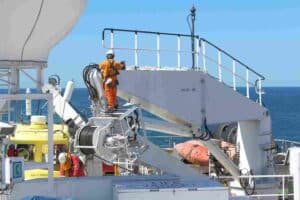
If you work in the maritime industry, you most likely know just how easily a maritime injury can occur. With such a high-risk industry, you must understand the laws in place to protect you in the event of an accident. You will want to seek assistance from a Corpus Christi maritime attorney to protect your rights and well-being.
The Importance of the Maritime Industry in Texas
The maritime industry plays a vital role in the economy of Corpus Christi and surrounding cities in Texas. The port and maritime activities., such as fishing, oil and gas, shipping, and shipbuilding, contribute to the city’s prosperity.
Additionally, this industry provides several job opportunities for residents. Workers in the maritime industry have very diverse roles, and, unfortunately, they understand the unique nature of the job as well as the associated risks and challenges. Due to the nature of work, it is common for injuries to occur.
Common Causes of Maritime Injuries
Maritime injuries can arise from various situations. Some of the leading causes include:
- Vessel Accidents: Collisions, grounding, and capsizing are common accidents involving vessels. Crew members and passengers alike can sustain injuries during these incidents.
- Slip and Falls: Slippery decks, wet surfaces, and unstable ship conditions contribute to slip and fall accidents. These incidents can lead to severe injuries, especially in adverse weather conditions.
- Equipment Failure: The maritime industry relies heavily on complex machinery and equipment. Malfunctions or failures of these tools can result in injuries ranging from minor to catastrophic.
- Chemical Exposure: Workers in the maritime industry may face exposure to hazardous substances. This can lead to health issues, ranging from respiratory and skin conditions.
- Lack of Training: Inadequate training of maritime workers on safety protocols and emergency procedures increases the likelihood of accidents. Proper education is crucial to prevent injuries and respond when incidents occur.
Any of these factors can result in significant injuries for victims. Common types of maritime injuries include:
- Back and Spinal Injuries: Heavy lifting, repetitive motions, or sudden accidents can lead to back and spinal injuries among maritime workers.
- Fractures and Trauma: Vessel collisions, falls, or equipment accidents can result in fractures, bruises, and other traumatic injuries.
- Burns and Chemical Exposure: Workers dealing with fuels, chemicals, or machinery are at risk of burns and exposure-related injuries.
- Drowning and Water-Related Injuries: Maritime accidents can result in drowning or other water-related injuries, especially for crew members involved in ship incidents.
Contact a Corpus Christi maritime attorney immediately if you are dealing with a maritime injury. A legal advocate can help you understand the laws and how they can affect your compensation claim.
Laws Surrounding Maritime Accidents and Injuries
Several laws are considered when it comes to victims of maritime accidents.
Understand the Jones Act
This federal statute provides various types of protection and legal recourse for maritime workers who suffer injuries during their employment. This U.S. federal law requires goods transported between U.S. ports to be carried exclusively on vessels built, owned, and operated by American citizens or entities. The Jones Act was enacted to promote a strong domestic maritime industry and ensure a capable merchant marine during war or national emergency. It also mandates that vessels engaged in coastwise trade be U.S.-built, flagged, and crewed. This protectionist measure aims to support the American shipping industry, maintain a skilled maritime workforce, and safeguard national security interests by fostering a self-sufficient maritime fleet for domestic transportation. This law typically covers workers who perform at least 30% of their work on vessels. These individuals include fishermen, stewards, bartenders, cooks, drillers, engineers, pilots, mates, divers, and anchors.
The Longshore and Harbor Workers’ Compensation Act
This law is designed to offer protection to injured maritime workers who fall outside the coverage of the Jones Act. This legislation safeguards individuals not categorized as seamen, encompassing various roles such as ship repair persons, longshoremen, harbor workers, shipbuilders, ship-breakers, and employees engaged in loading, unloading, or maintaining vessels in navigable waters.
Workers at wharves, dry docks, piers, terminals, or marine railways are also entitled to compensation for injuries sustained while performing their duties. The LHWCA extends coverage to various maritime occupations, ensuring workers receive compensation for workplace injuries.
Death on the High Seas Act (DOHSA)
This law protects the rights of families affected by the tragic loss of maritime workers while actively engaged in their employment on a ship or vessel in navigable waters. Designed to provide substantial compensation to families grieving the loss of a loved one in the maritime industry, the DOHSA facilitates recovery through wrongful death claims against negligent employers.
Eligible individuals are limited to spouses, children, parents, or other dependent relatives. Those who are deemed eligible can seek compensation under this statute. The death must be attributed, either partially or entirely, to the fault of the victim’s employer for a family member to qualify for compensation under the provisions of the DOHSA.
Maintenance and Cure
Maintenance and Cure is a legal principle designed to support maritime workers injured while on the job. Eligibility for maintenance and cure is based on classifying the individual as a maritime worker. The primary classifications who qualify for this protection include:
- Merchant seamen
- Commercial Fisherman
These benefits remain accessible until you achieve maximum medical improvement or recover to the fullest extent possible with appropriate treatment. There are instances where a complete restoration of the health and mobility lost due to a severe accident may not be achievable. Consequently, you will continue to receive maintenance and cure benefits, addressing ongoing expenses such as food, utilities, housing, and other daily living expenses,
If you sustained a maritime injury or your loved one died as a result of a maritime accident, you must contact our personal injury lawyer in Texas immediately. You may be able to file a legal claim to recover compensation and various other benefits. Our personal injury lawyer in Texas will review the accident’s circumstances, identify all applicable laws, and take the necessary steps to protect your rights.
Contact Our Corpus Christi Maritime Attorney Today
The consequences of maritime accidents can be devastating both physically and financially. That’s why it’s important to have an experienced and dedicated legal team on your side fighting for your rights.
The Burkett Law Firm of Corpus Christi has a proven record of success in helping maritime accident victims receive the compensation they deserve. Don’t hesitate to reach out for a free consultation with our knowledgeable personal injury lawyer in Texas today. We are here to support you and guide you through this difficult time. Remember, at The Burkett Law Firm, we are not paid unless you do.





